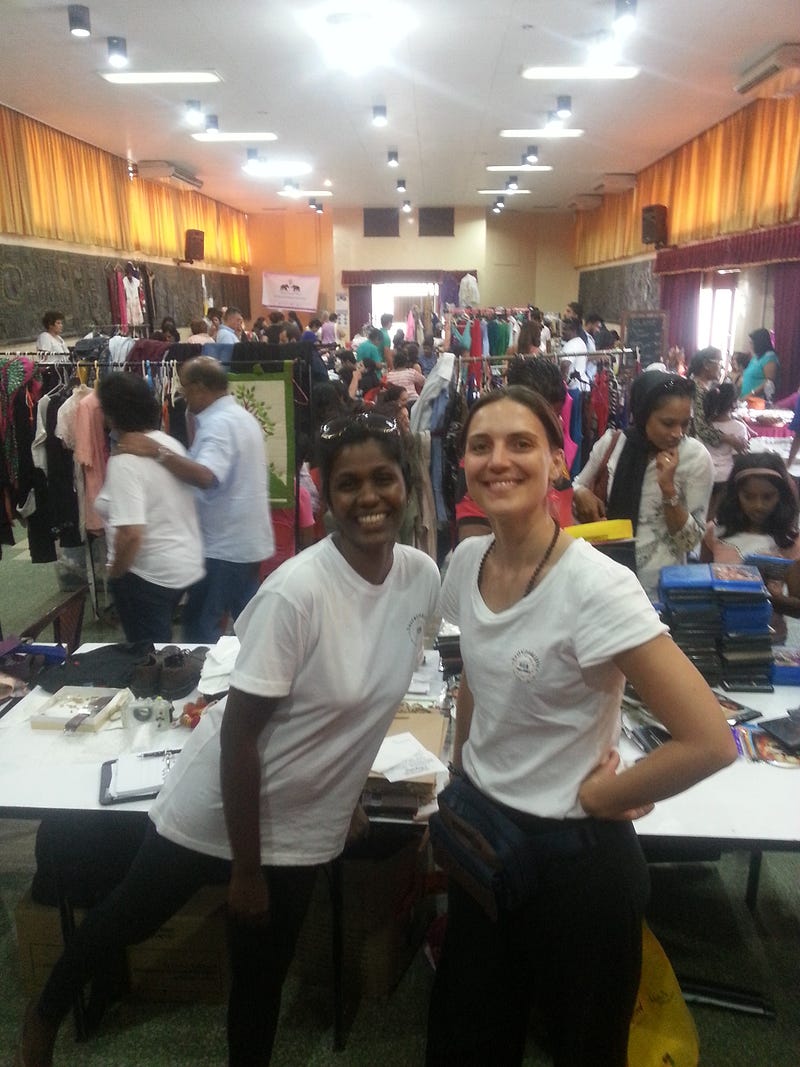Born in Austria thirty-five years ago, Sabine Samarawickrema has devoted a huge part of her life to questions tied to sustainable consumption. During her Ph.D., which was completed in Vienna in 2011, she travelled to a lot of different places, working among others for the United Nations in New York. Having met her future husband in New York, she moved to Sri Lanka in 2011 and started working with various NGO's and the UN, active in the field of sustainable development, child protection or education.
But this enthusiastic young woman had to have her own way: one year later, (shedding some youthful illusions along the way), she turned her former employers into partners by starting ‘SaMara’, her own consulting business in Colombo, Sri Lanka. Very soon, Sabine focused her activities on two main fields: helping build peace processes and, first and foremost, raising awareness about responsible consumption. “When I moved in Sri Lanka, people would be puzzled by the very notion of sustainable development, that few seemed to have understood.”

In 2013, she launched a platform called Sustainability Hub Sri Lanka, a network starting as a Facebook page. “It offers a space to connect and share information on Sustainable Development, and aims at raising awareness, sharing information and connecting people. It focuses on the use of resources by ordinary citizens, especially regarding bad habits of waste disposal, unfortunately widespread among locals both in urban area and in the countryside.”
Her second initiative was the Colombo Flea market, a market space which offers vendors a place to sell second-hand and upcycled items as well as food, taking place each few months in Colombo city. “Its goal is to raise consumer awareness, getting them to think about their habit of constantly purchasing new stuff and throwing away sometimes even unused items. This event shall especially raise awareness on waste management and a circular economy.”
“We have to deal with a huge problem of waste here in Sri Lanka. Collection systems do not work really well and there are places in Colombo where the waste simply remains on the side of the road. It is common to burn trash instead of trying to recycle it. The average person is comfortable throwing waste on the street, when you are driving downtown behind a bus, it's not unusual to see stuff falling out the window! This also leads to huge sanitary issues, like dengue epidemics. From what I could see, this is a problem that most people agree is real, but few seem concerned by it.”
As if the matter wasn't complex enough, a divided political landscape and corruption issues must be taken into account. There seems to be a lack of serious political will to tackle those problems, as observers say the current government is divided on the issue. Furthermore, “there is a lot of money made from waste”, as Sabine explains. “Some land owners are renting their parcels to turn them into waste dumps. Recently one of the waste dumps collapsed, burying a number of people. This tragic event led to several new waste management initiatives by the government, NGOs as well as the private sector. Hope remains that these initiatives will show a positive impact.”
Taking part in UNITAR's courses on sustainable consumption and production helped Sabine strengthen the knowledge she acquired in the academic world and on the field, giving her the ‘bigger picture’:
“What I learned in the university was primarily focused on consumption, while these on-line courses also dealt with production policies and the whole supply chain, it was a very comprehensive overview. Besides, I really enjoyed being able to interact with people from other parts of the world. I've met and shared information with people from Bhutan or Viet Nam, and maintained contact with them afterwards.”
Sabine is now few months from completing a new and exciting project: an online platform designed to, “help you getting rid of everything you have in your home, whether you want to sell it, exchange it or donate it. It also lists every object made of glass, metal, cardboard or plastic, including every non-organic waste. It took a long time to develop, and to raise the required funding. UNITAR supported the project and believed in my idea, I was very happy of this support. I had the idea in my mind since some time, but the courses I took helped me improve it. And since it also helped me to find more funds, it definitely helped the project to take off.”

